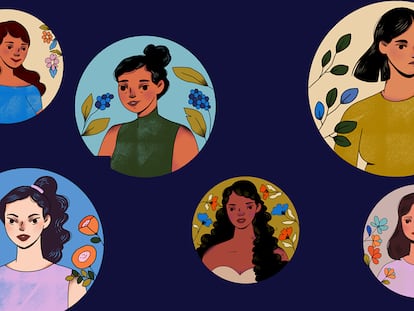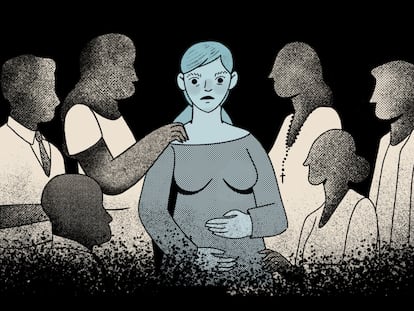Beatriz vs El Salvador: The landmark case that could change the most restrictive abortion laws in the Americas
The Inter-American Court of Human Rights is investigating how a 21-year-old, who was diagnosed with lupus and carrying a fetus that would not survive outside the womb, was not allowed to terminate the pregnancy
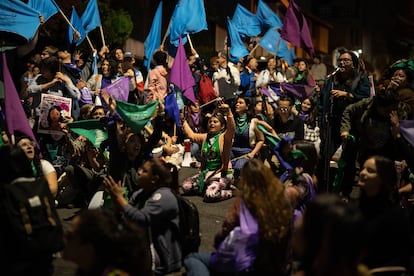

“When my daughter was told she was pregnant and had lupus, the doctors said she could not continue with her pregnancy, because both of their lives were in danger. They said that there was only one way she could be saved, but that they couldn’t do it. They couldn’t allow an abortion.” That’s how the mother of Beatriz, a young woman who lost her life after being denied an abortion, began her testimony in the landmark case: Beatriz vs El Salvador.
For the first time, the Inter-American Court of Human Rights (IACHR) is investigating the total ban on abortion in El Salvador, where it is a crime under any circumstances, and punishable by up to 50 years in prison. A favorable ruling for the family of Beatriz (whose real name remains under seal) could ease the most restrictive anti-abortion law on the continent and set a precedent for the region.
“For my daughter, making the decision to continue living was torture. I don’t want anyone to go through what my daughter went through. That’s all I want,” her mother told the court in San José (Costa Rica) on Wednesday.
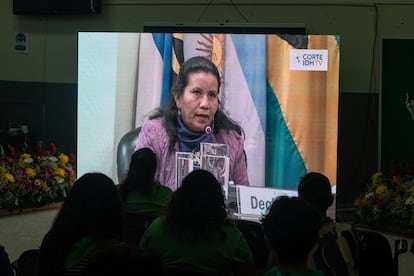
Beatriz was 21 years old and had a nine-month-old boy when she was given a difficult diagnosis: she suffered from lupus, severe kidney damage and arthritis. She also learned at that age that she was pregnant with a fetus that was developing without a skull or brain — a malformation incompatible with life. Beatriz requested an abortion when she was 13 weeks pregnant, but due to the country’s anti-abortion laws had to take her case to the IACHR. In May 2013, 13 weeks after Beatriz’s petition, the IACHR called on El Salvador to allow her to terminate the pregnancy. The state agreed to perform a C-section — a much more invasive operation than initially required — and the fetus died five hours later. As a consequence of the 13-week delay, Beatriz’s health was “extremely” weakened, and she died four years later after being hospitalized for a minor motorcycle accident.
Dr. Guillermo Ortiz, who also oversaw her first pregnancy, determined that continuing with the new pregnancy would be “high risk.” “Given that there was no possibility of reversing the congenital anomaly of the fetus, we only had to protect the life of this woman,” he told the seven independent magistrates of the IACHR, the highest court in the region.
The recommendation to terminate the pregnancy was brought to a committee of 15 doctors, who all concurred. However, they could not carry out the abortion “for fear of reprisals.” In El Salvador, health workers who recommend or perform abortions face up to 12 years in prison. In view of this, some doctors violate doctor-patient confidentiality and report their patients if they are suspected of inducing an abortion.
A historical precedent
After the hearings on Wednesday and Thursday, both parties will have 30 days to present written arguments. The court is expected to reach a verdict by the end of the year. A ruling in favor of Beatriz could lead to several different outcomes. But what happens ultimately depends on the government of Nayib Bukele. The president of El Salvador came into office promising to address the injustices in the country, but has since transformed his policies into authoritarian measures that ignore human rights, including access to abortion. “When my wife and I went to see the first ultrasound, and we saw that little heart, to me, it was already my daughter. And thinking about destroying or killing her... It’s difficult. Even if it’s the child of a rapist, it’s your child,” Bukele said in an interview.
During the election campaign, he said the people who demanded Beatriz continue with the pregnancy were “fanatics.” But those statements are long gone. In 2021, he made it clear he opposed any attempts to legalize abortion, even comparing the procedure to “genocide.”
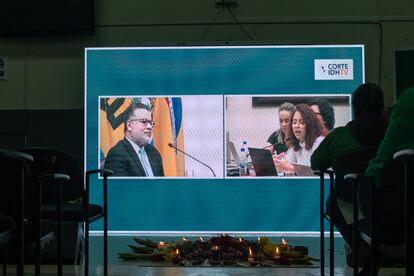
This is not the first time that El Salvador’s strict abortion laws have caught international attention. In February 2020, the United Nations demanded the release of three women who had been imprisoned after suffering a miscarriage. Since 2009, 70 women imprisoned for similar reasons have been released from jail. Rosita is the most recent victim to be released. She fell pregnant after being raped, and was sentenced to 30 years in prison for having a miscarriage. She spent 4,934 days behind bars before being released. Another six other women remain in jail.
“The president always talks about how he is going to ‘change history.’ This is a perfect moment to do it,” says Alejandra Burgos, a member of the Feminist Collective, who also took the case to court. “This trial is not an attack on Bukele, as some want to make it appear. This is to demand justice for what happened in 2013 and what continues to happen with so many other women,” she adds.
“Why didn’t she have an abortion outside the system?”
In a room in the University of El Salvador, where the video of the hearing was being live-streamed, dozens of women clicked their tongues to a question made by Humberto Antonio Sierra, one of the most conservative judges in the IACHR. During the hearing on Wednesday, Antonio Sierra asked Dr. Ortiz: “If I were a woman who was told that her life was at risk and that my son was going to be born without a head... Knowing that there are ways to abort illegally, why didn’t she do it outside the system?” Dr. Ortiz replied: “Well, I don’t know. But to do that, you have to have resources. And I knew her, and she didn’t have any.”
Although El Salvador is one of the 20 countries that recognize the IACHR, feminist organizations fear that the Bukele government will not comply with the court’s ruling. “Unfortunately, in the current context, it’s possible, since this government has made alliances with anti-rights groups and has spoken out against the rights of women and girls... That is a big concern,” explains Erika Guevara, the regional director of Amnesty International.
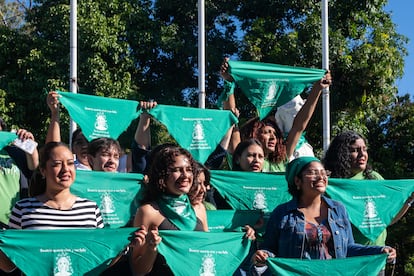
This concern is shared by dozens of gynecologists in the country, who since 1998 — when the penal code criminalized abortion under all circumstances — have had to tell women with life-threatening pregnancies: “I can’t do anything.” Doctor Miguel de Guidos is one of them. “There are cases in which science is clear on what to recommend, but our hands are tied,” he explains.
Both feminist organizations and the data show that criminalization does not lead to a fall in the number of abortions: it just forces women to find unsafe ways to terminate their pregnancies. In El Salvador, Haiti, Honduras, the Dominican Republic and Nicaragua — the only five countries in the region where abortion is listed in the criminal code — hundreds of women have lost their lives due to anti-abortion legislation.
“My daughter was given a crib after deciding to have an abortion”
During the first session of the hearing, Dr. Ortiz and Beatriz’s mother spoke out against the persecution of self-styled “pro-life,” anti-abortion groups, which have important influence in the country and in sectors of the government. “My daughter was given a crib after deciding to have an abortion,” Beatriz’s mother told the court. Lawyers representing Beatriz added that the young woman also received woolen hats after the fetus was born without a skull or brain, as predicted by the doctors. “We lived through real torture,” said the mother.
Anti-abortion groups have been closely following the case: they called for protests outside IACHR headquarters, organized online prayer vigils throughout the continent and have accused feminist organizations of manipulating history. “There is a huge [anti-abortion] lobby that also has influence in government. It’s undeniable,” says Burgos from the Feminist Collective.
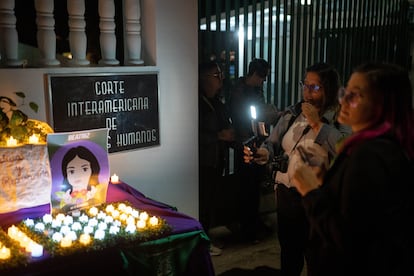
Although this is the first case brought to the IACHR that examines the impact of total abortion bans, the court has previously issued favorable verdicts on women’s sexual and reproductive rights. In 2012, in the case of Artavia Murillo vs. Costa Rica, the court ruled that the protection of the embryo was “gradual and not absolute.” “The embryo cannot be understood as a person,” the sentence read. But 11 years have passed since then, and little has changed in Central America, where the Catholic Church and conservative sectors have great power.
“We need to discuss access to abortion based on evidence, not opinion,” says Marcia Aguiluz, the legal director for Latin America at Women’s Link Worldwide, by phone. “In the continent, the trend is moving towards decriminalization, but in Central America, the changes are coming slower.” Feminist organizations across Latin America hope the IACHR ruling on Beatriz’s case will change that.
Sign up for our weekly newsletter to get more English-language news coverage from EL PAÍS USA Edition
